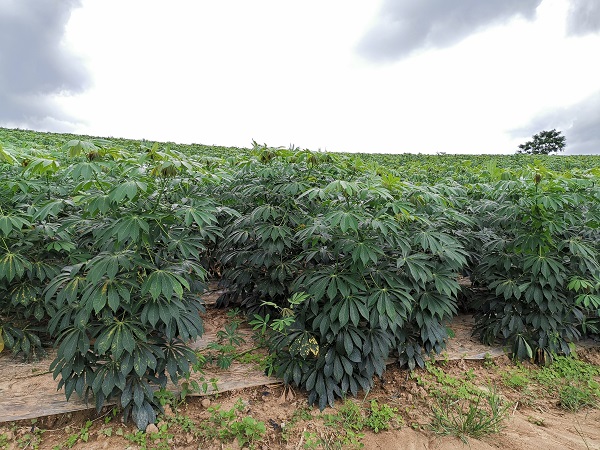China and ASEAN member countries have been working closely in the agricultural sector to enhance food security and promote economic growth.
The two sides have launched many programs over the years, covering areas such as agricultural technology exchange, talent training, and market access.
Durians, bananas, and other tropical fruits are well-received by many Chinese households thanks to years of agricultural cooperation between China and ASEAN nations.

A cassava genetic breeding site in Nanning, Guangxi Province. [Courtesy of Guangxi Subtropical Crops Research Institute]
Lv Ronghua with Guangxi Academy of Agricultural Sciences says the two sides have jointly initiated a number of agricultural programs to deepen cooperation.
"Over the past two decades, we have established ten demonstration bases in ASEAN countries and set up three joint laboratories in Vietnam, Laos and Thailand. We have successfully cultivated over a hundred different types of agricultural products, such as rice, corn, vegetables and fungi."
The agricultural expert says the two sides have also conducted many personal and technical exchanges, and the introduction of high-quality agricultural varieties from China has boosted the growth of agricultural industries in ASEAN countries.
A notable example is an agricultural demonstration base set up in northern Vietnam in 2016, where China's latest grape breeding techniques have been introduced.
"A grape breeding technique developed by the agricultural demonstration base has been implemented in 25 cities in Vietnam and received much positive feedback. China's breeding technique is at a relatively higher level."
The Guangxi Academy of Agricultural Sciences has also created many technician training programs aimed at nurturing agricultural talent for ASEAN countries.
These programs have been highly effective in training hundreds of local farmers, enhancing their knowledge and skills in modern agricultural practices.
"We have set up many cooperation bases to promote the application of agricultural technologies and encourage talent exchange. By further promoting technological cooperation, China's advanced agricultural technologies can be shared and applied in various ASEAN countries. The technological progress can also bring prosperity to local regions."
Li Jun is an agricultural expert with Guangxi Subtropical Crops Research Institute. His research team has cultivated many high-yield cassava varieties through collaborations with scientific research institutions in Thailand, Vietnam and other ASEAN countries.
Li says due to different geographic conditions, agricultural cooperation between China and ASEAN countries can help the two sides reap more economic benefits.
"We exchange seed resources and cultivation techniques. We have introduced many excellent seeds from Thailand and Vietnam and shared our techniques with Laos and Cambodia. Our domestic varieties can enhance productivity in these two countries by about 30 to 50 percent."
Meanwhile, the expert says many cold chain logistics and trading centers have also been established in China for ASEAN to strengthen connections between the two markets.
"After the China-Laos railway opened, it's more convenient for Lao agricultural products to be transported to China. Many Chinese businessmen have invested heavily in Laos to set up farms. And they want more of the better agricultural varieties."
China has been ASEAN's largest trading partner for the past 13 years. Figures show China's agricultural investment in ASEAN countries accounts for around 40 percent of its overall overseas investment in the agricultural sector.
原文链接:https://radio.cgtn.com/news/recommend/China-ASEAN-aim-for-better-agricultural-cooperation/2312

